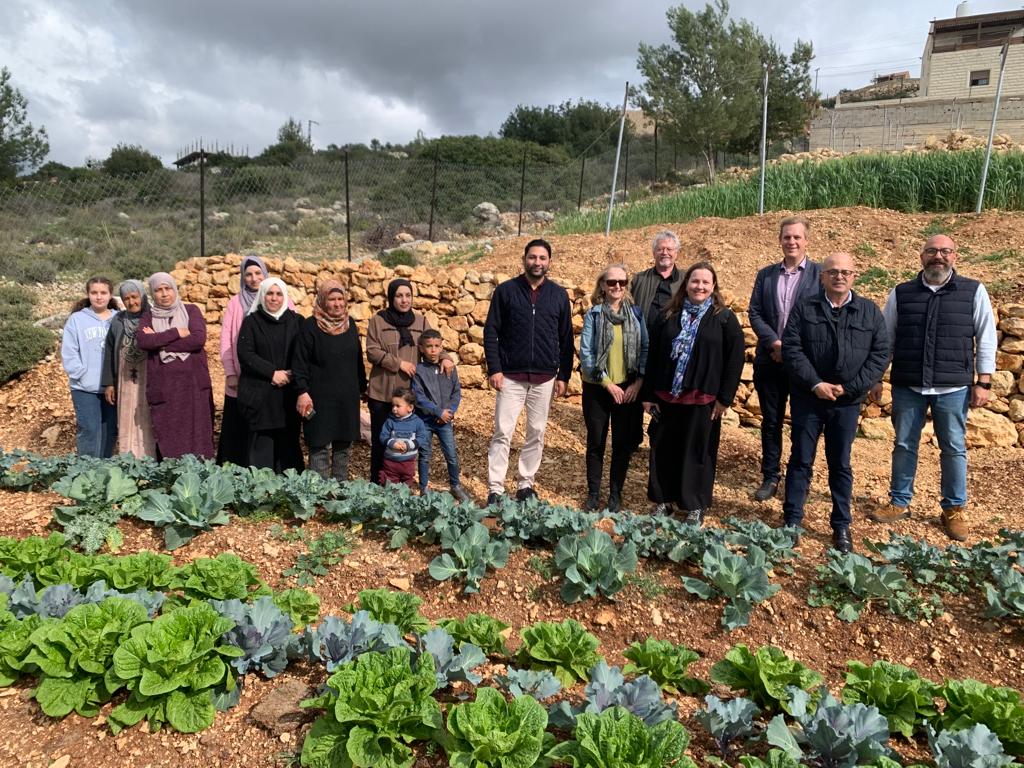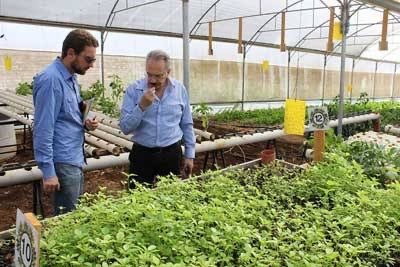Sami Khader is the Director of the MA’AN Development Center in Palestine, a long-term partner organisation of Union Aid Abroad-APHEDA.
He gave this address to the Australian Parliamentary Friends of Palestine group on 22 March 2023.
————————————–
Thank you for giving me the opportunity to address your meeting, and to convey to you, the suffering and pain of our people, who have been under prolonged military occupation for the last 56 years.
On behalf of the Palestinian Non-Government Organisations (PNGO), I would like to seize this opportunity to express our thanks and appreciation to the Australian people for their long solidarity and support. Australia has supported Palestinian Non-Government Organisations for over 40 years. During that time, hundreds of thousands of Palestinians have been helped in job creation, agriculture and food security, health services, income-generating projects for poor women, and more. We are so proud of our partnerships with the Australian NGOs and look forward to having a new joint NGO program. Australian aid has achieved great outputs and outcomes for the Palestinians in the West Bank and Gaza Strip. Please do not give up supporting Palestinian organisations.

Palestinian women are create income and food security through their involvement in a food cooperative.
The importance of the PNGOs in the Palestinian context
The PNGO sector is a major pillar of Palestinian civil society. Palestinian Non-Governmental organizations are active in many fields such as human rights, lobbying and advocacy, democracy promotion, good governance, and women’s rights. They also support social services such as education, health, mental health care, rehabilitation services for disabled people, water, sanitation and hygiene, shelter, protection, agricultural and environmental services, youth and women empowerment, economic development, and legal aid.
It is crucial that they continue receiving all kinds of solidarity and support to be able to fulfill their roles and responsibilities towards their people.
As the Director of MA’AN Development Center, our work involves working with the poor and most marginalized sectors of our society, in three main areas. These are agriculture and natural resources, social and economic empowerment for youth and women and protection. We cover all West Bank including East Jerusalem and Gaza Strip through our seven branches and through our 290 professional employees. We have the honour to work with Union Aid Abroad-APHEDA for the last 34 years and managed to achieve great results in different fields.
Ongoing violence makes our work difficult
I have to say that the situation of the Palestinian people in both the West Bank, including East Jerusalem, and the Gaza Strip is deteriorating rapidly on both humanitarian and political levels. Prospects for a rapid overcoming of the occupation are absent and make our lives and work extremely difficult.
Allow me to share with you some of the general challenges that we face and suffer from, and their consequences on our present and future. I would like to pinpoint some of these main points:
- The ongoing Israeli aggression and violation of human rights, and the dramatic increase in levels of violence from the Israeli army and settlers. The rate of violence and attacks increased by more than 170% from 2021 to 2022. There is an absence of freedom of worship and increased restrictions on Palestinian citizens. Both Christians and Muslims are deprived of their basic rights, such as the right to worship, and access to holy places in Jerusalem, which are subject to attacks by extreme Jewish settlers and daily storming of Al-Aqsa Mosque. The other issue is the horrible attacks on children. The number of children who were killed by the Israeli army and settlers from 2000 to 2022 reached 2,264 children.
I am sure that you have heard about the settlers’ attack on a small town in the north part of the West Bank called Huwara. Last February, around 400 settlers attacked the town and set fire to homes, cars and shops. One father said “They were burning our house with kids inside. The army didn’t let us through.” This attack resulted in the burning of 82 homes and 102 cars and tens of Palestinians were injured. This is only a small, shocking attack but it one of the hundreds of shocking attacks by settlers daily.
Another example is the case of an 18-month-old Palestinian boy who was burned to death in 2015, after settlers set fire to his family house in Duma village, in the north of the West Bank. The parents of Ali Dawabsheh and his four-year-old brother were also injured in the attack.
Colonisation of Palestinian lands
- The continuous confiscation and colonisation of the Palestinian lands and the expansion of settlements in the West Bank. There are 200 settlements with 916,000 Israeli settlers in East Jerusalem and the West Bank, that is around 13% of the Jewish population in Israel.
The goal is to control the lands and deprive the Palestinian citizens of their lands. This situation is much worse than in Apartheid South Africa which I know you are familiar with. So many organisations, including Human Rights Watch, Amnesty and even Israelis call the situation in the West Bank and Gaza Apartheid.
We know about Australia’s position on a two-state solution, but this is impossible with ongoing settlements and nearly a million Israeli settles on Palestinian land.
This policy of apartheid led to the fragmentation of Palestinian territories and created difficulties and restrictions in mobility of people and goods. For example, a journey that should take ten minutes, will now take over four hours. Imagine going from one place in Canberra and having to go through four military checkpoints to get to where you work in Parliament House. There are 106 permanent checkpoints scattered across the occupied West Bank and East Jerusalem. Turning our lives into hell.
Destruction of natural resources
- The other challenge is the destruction of natural resources, both land and water. Israel controls more than 85% of our water aquifer in West Bank. The Palestinian in Jordan Valley consume, an average of 30 litres per day while the Israeli settler in JV consume, from our water, 487 litres per day. Access to clean drinking water and adequate sanitation is a fundamental human right, but only one in ten people in Gaza has direct access to clean water.
- Another point related to the impact of the annexation and separation wall. More than 85% of the wall was built inside the West Bank. Building the wall made the lives of Palestinians more difficult and imposed lot of restrictions from reaching their lands behind the wall, which consists around 3% of the West Bank area.
- The continuous destruction of the agriculture sector and environment and its critical impact on the lives of the Palestinians and their main livelihood. More than one million olive trees were uprooted or burnt by the occupation and settlers since 1967.
- Adding to the previous points the comprehensive apartheid zoning and planning regime imposed by Israel on Palestinians in Jordan Valley, East Jerusalem and Area C and its impact on the lives of Palestinians.
War against Gaza
In addition to the blockade on Gaza Strip since June 2007. Five wars were launched against Gaza Strip for the last 15 years, led to the killing of thousands of Palestinians, the destruction of tens of thousands of homes and infrastructures, the destruction of people’s sources of livelihood, and the transformation of the Gaza Strip into the largest open prison, where 2.35 million Palestinians live there, suffering from extreme poverty, unemployment, and deprivation of the simplest necessities of life such as clean water, electricity and medical treatment
All these violations led to:
- Loss of hope among most of the Palestinian people, particularly the Palestinian youth.
- Systematic destruction of livelihoods (farmland, buffer zone, fishing sector in Gaza)
- The dramatic increase in poverty and unemployment at an alarming rate, 44% of youth between the ages 20-24 are unemployed, and 55% of females are unemployed.
- 4% of youth graduates with a diploma and above are unemployed (67% males & 84% females)
- Around 2.3 million people are in need of different types of assistance.
- Increased food insecurity. Around 1.6 million people in the Occupied Palestinian Territories are food insecure.
- Israel control the Palestinian National Authority tax revenue since January 2015.
- Internal political division and the absence of an effective political system.
- Change in social patterns and growing intolerance and undemocratic and factional tendencies within society.
Shrinking civic space
At the PNGO level: NGOs are suffering from what we call the shrinking civic space. The main goal behind the shrinking space is:
- Drying and draining the sources of funding.
- To silence the voice of PNGOs and any entity that highlights Israeli violations of international and humanitarian law.
- Stop the projects implemented by PNGOs, International Non-Government Organisations and United Nation agencies that has a real impact on the ground especially in Area C.
- Hindering the work of PNGOs in supporting the resilience of the Palestinians.
The result is a very risky environment that is inappropriate, impossible, and unhealthy for the work of the Palestinian Authority and Palestinian institutions.
Australia should continue to morally and financially support the Palestinian people
Australia, as a member of the UN and the democratic world community has the political, moral, and ethical responsibility to support Palestinian people in their struggle for freedom, peace, sustainable development, and a state of their own. Palestinians cannot do so without international and Australian support and solidarity.
At the end of my speech allow me to suggest some recommendations and requests from the Australian Parliament:
There is an urgent need to:
- Implement the Labor government’s commitment to recognise Palestine.
- Pressure Israel to comply with international law and the Geneva Convention.
- Respect and defend Palestinian right to freedom of expression, which is one of the basic freedoms.
- Pressure Israel to stop the collective punishment of the Palestinians.
- End the siege on Gaza and ensure the protection of civilians in the West Bank and Gaza Strip.
- Make specific visits to Palestine to see firsthand the situation.
- Advocate for the removal of restrictions on the movement of people and goods in and out of Gaza and the West Bank.
- Pressure Israel to stop the attacks on Palestinian NGOs.
- Continue work to inform the Australian people about our situation.
- Continue supporting United Nations Relief and Works Agency for Palestine Refugees in the Near East and revisit the financial assistance to PNGOs as it was very successful and now even more needed. Please, we need your political and financial support.
Finally, peace will only be achieved with justice for the Palestinians, and we ask Australia to help us achieve this justice.
Thank you for your understanding, support, and solidarity.
